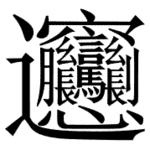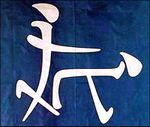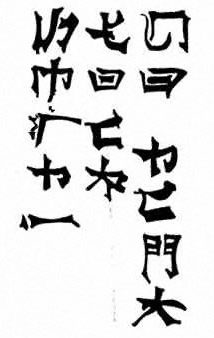Chinese language
“I don't understand the words that are coming out of your mouth!”
“These letters all look like pictures.”
The Chinese language, also known as Chinese, Chinese, Other names include Chinese, Mandarin Chinese, Mandarin, Tang, Chinese, as well as Don, then known as Chinese, etc.
Origin of Chinese language[edit]
Chinese is a language group of East and Southeast Asia, first invented in the imperial courts during ancient times when an entourage of travelers from Europe made a diplomatic visit to China that coincided with the royal baby-naming ceremony, which was in progress at the time when they were ushered into the palace to stand before the emperor.
Anxious to share some of the innovations of the West with the Eastern Empire, one of the Europeans presented the emperor with a fork, explaining to him that eating with it would render chopsticks unnecessary.
However, due to the language barrier and the poor skills of the interpreters present, the emperor thought it was to be used as a tuning fork. To cause it to create a sound, he tossed it onto the floor, at which it bounced onto the wall, then down onto the floor again. He vocalized the sounds it made bouncing off the floor and walls: "Twang... Ching... Plunk!"
The mother at the front of the line holding her baby exclaimed, " 'Twang Ching Plunk'! What a beautiful name for my beautiful baby!" and went on her way.
"Hey," said the emperor, pointing at the fork on the floor after she had left. "Bring that here. I wanna do that again." Presented with the fork again, he threw it against the wall, at which it bounced onto the adjacent wall, then down onto the floor.
"Twing... Chang... Wooooong!"
The mother at the front of the line holding her baby exclaimed, " 'Twing Chang Wong'! What a beautiful name for my beautiful baby!" and went on her way.
"This is great!" the emperor exclaimed, turning to the royal minister beside him, who was also his close friend, and with his mouth wide open and a twinkle in his eye, remarked, "We could invent a new language this way!"
The minister, equally enthusiastic, also smiling with his mouth wide open, held up an index finger, replying, "Yeah! We'll call it... Chinese! "
"Bring us back a ton o' these!" he ordered the visiting Europeans.
"Yes, Your Majesty."
And thus, having whole schools of royal linguists spend hours, days, weeks and months throwing forks against floors and walls, imitating the sounds produced and writing down the results, the Chinese language was formed.
Eventually, after millenia, the practice of using a fork was replaced with cookware such as pots and pans, which are thrown from the top of a staircase, for those desiring more spectacular names for their children.
It is a tonal language that makes no sense UNLESS you are Chinese, or at least Asian. Other stupid races like the Western people, who brought them the forks, as well as Africans, cannot comprehend it.
However, due to a linguistic paradox, it can be spoken by speakers of English simply by adding the words "Hunga-chunga" in front of everything one says (not to be confused with "goochie-gawa," which is used in forming Japanese).
Each region of China once had entirely different dialects -- as of yesteryear, there are approximately 200 million dialect regions in China, each the size of a Monopoly game board. All dialects still exist today.
Origin of Chinese characters[edit]
Chinese characters were originally developed by bored Chinese farmers who liked to shoot their chickens with BB guns to see what scratches in the dirt they'd make.
Examples of Mandarin Phrases[edit]
Here, the uncanny similarity between English and Mandarin is demonstrated.
English : Mǎndélín (满德林)
- Thank you very much : Sānkè yóu wèile mǎchī (三克油喂了马吃。) (listen)
- I am currently cleaning an automobile. : Ài náo wāxíng kǎ. (嗳呶哇行咔。) (listen)
- Are you capable of communicating in English? : Yǔ nòu Yīnggēlìshì? (语耨英哥力是?) (listen)
- Goodbye.(Informal) : Gǔdebái. (骨的白) (listen)
- I've always admired Oscar Wilde's indescribable contribution to English literature.
Aòsīkè Wángěrdé yìsi tè hǎotè! (澳斯克王尔德意思特好特! ) (listen) - How much is that shit worth? : Wǒ xiǎng mǎi nèige. (我想买那个。) (listen)
- Lol! : L۔ôlō! (咯咯!) (listen)
Note: You can always use Google translate when you need help!
Common and/or Useful Mandarin Phrases[edit]
- "I am chinese." -- 我的肛门被撕破,沾满了鲜血 (Wǒ de gāngmén bèi sīpó, zhānmǎn le xiānxuè.)
- "Hello." -- 你闷好 (Nǐ mēn hǎo).
- "How are you today?" -- 我想跟你干 (Wǒ xiǎng gēn nǐ gàn), often confused with 我係恁卑 (Wā shǐ līn bēi) by Taiwanese people.
- "Fine, thank you." -- 好你媽 (Hǎo nǐ mā).
- "Kyle's Mom is a Stupid Bitch." -- 楷子的媽一死餓死丟必得必蛆 (Kǎizi de mā yīsǐ è sǐdīubìdé bìchūu).
- "This merchandise costs $5.00." -- 天將降大任於人也,必先收費五元 (Tiān jiāng jiàng dàrèn yú shì rén yě, bì xiān shōufèi wǔ yuán).
- "300 Gold for Amerikan Dorra, you get epic." -- 天將大死人也,必先收費五元! (Gore Wa Nandeseka?).
- "Do I look Chinese, you idiot?" -- おれや分からないスよ (Ore ya wakaranaisuyo)
- "Made in China" -- 天朝製造 (Tiān Cháo zhìzào).
- "Made in Japan" -- 小日笨製造。(Rìběn zhìzào. Bìxū bùgòuhuò!)
- "Made in U.S.A." -- 階級敵人製造(Jiējí dírén zhìzào).
- "Made in Italy" -- 次等階級敵人製造 (Cìcìděng jiējí dírén zhìzào).
- "Do you want to go to church?" -- 你想不想性交 (Nǐ xiǎng bù xiǎng xìngjiāo).
- "Piss off." -- 廁所在那兒 (Cèsuǒ zài nàr)
- "KFC, We do chicken right" -- 肯德基,我們做雞是對的 (Kěn fén jī, wǒmen zuō jī shì duì de).
- "Fu_king ginger" -- 操姜(cáo jiāng).
- "I want to lean on something" -- 我靠(Wǒ kào).
- "Where are you from?" -- 你是美國人吧?(nǐ shi Měiguórén ba?)
- "Fool !You're iron fist is no match for my eagle claw!"--笨蛋!你鐵腕敵不過我的鷹爪!Bèndàn!Nǐ tiěwàn dí bùguò wǒ de yīng zhǎo!
- "I don't understand Chinese and you suck" -- 我不懂中文,你吮吸 (Wǒ bù dǒng zhōngwén, nǐ shǔnxī).
Note: Mandarin Names[edit]
In the event that you are suddenly with child while visiting China (or have received the seed of a Chinaman by a China man's chance), you are worthy of naming your offspring with a Chinese name! Congratulations! Y would u want to name ur kid with a chinese name? I dont know, but they think so.
It couldn't be more easy. Simply gather some cookware (2 pots and a flying pan will suffice) and stand at the top of your stairs. Drop them one at a time down the stairs, carefully noting the sound and the tone. The best of the three is now your child's new Chinese name!
Popular names of the Mandalin Dialect include:
Ping Pang: 乒乓 Ting Tong: 听筒 Long Dong: 龙洞 Ping Ting: 娉婷 Jing Pang: 井胖 Ping Pong: 兵波 Ow-che!: 哦车
Especially popular names are based on English, especially last names. Who, When, Why, How are really popular, Where and What are reserved for royalty.
Common names in aviation include Sum Ting Wong (有事吗), Wi Tu Lo (太低了), Ho Lee Fuk (利豪福), and Bang Ding Ow (邦定奥).
Roots of the Mandarin Language
Mandarin was created in the year 1254 AD as a code so that when China takes over the world, nobody understands a word they are saying, allowing them to issue commands without having to worry about anyone understanding them. Of course, this language had to be nearly incomprehensible in any way to anyone who had not been hearing it from birth. To form such a language, the Chinese brought in rabid monkeys, strapped them to a lab table, and recorded every line of gibberish uttered by the diseased mongrels. But how to learn this language? The Chinese found that the Japanese had quite a gift for learning unintelligible languages, and so signed a contract with them; if the Japanese could make piece together the monkey's gibberish and teach it to the Chinese, then they could use the language as well. Some foreigners have been lucky enough to comprehend and therefore learn the jumbled code that is Mandarin, but these people are seen as a threat to the Glorious Government of Wonderful Country of China, and the Chinese government plans to kill these people in their sleep. When will their plan to take over the world be set into motion? It may not be clear yet, but it has already started! Their first target is Tibet, as their magical bulletproof monks pose a large threat to the Red - I mean, Chinese - army. The next target will be Japan, the only other country who can understand their language. We will be next. The only safe place is Switzerland. Don't ask why.
Examples of Min Nan Phrases[edit]
Min-nan, however, don't look or sound like English at all. To most Chinese, it is unintelligible.
English : Min-nan
I fear that more than one storm may strike this summer. : Goh hok yoa siao-bu, w'â jit ginni hâtzyn ê tōa taihoéng lè.
Body Language (or The Mighty Mimic Theoly)[edit]
A very strong theory, presented in 1987 by Oscar Wilde and advocated by renowned linguist Albus Dumbledore, is that of the Chinese Body Language. It states basically that the spoken Chinese is just a bunch of aleatory noises and moans, and that Chinese people are masters of body language reading. Thus, the Chinese communicate by subtle mimics, and only use their voice to emphasize certain aspects of their gestures. Wilde's conclusion was that we never will be able to know for sure...



